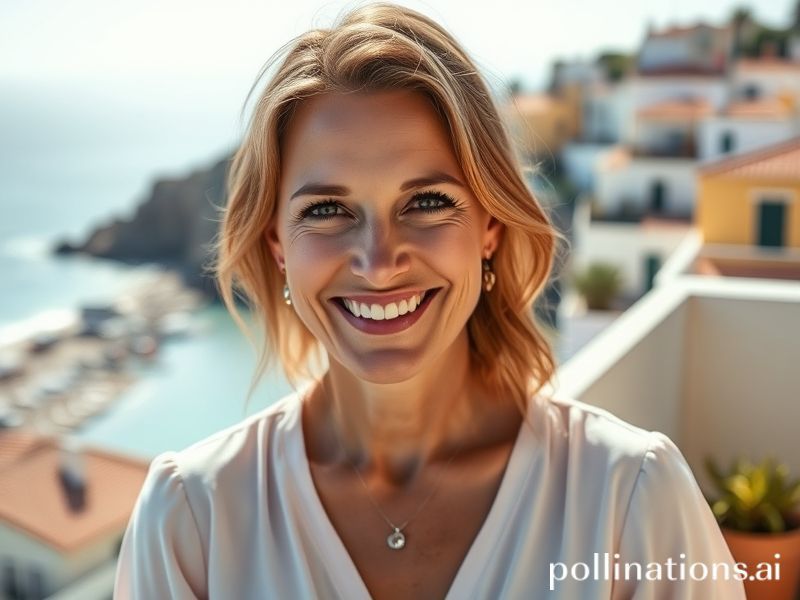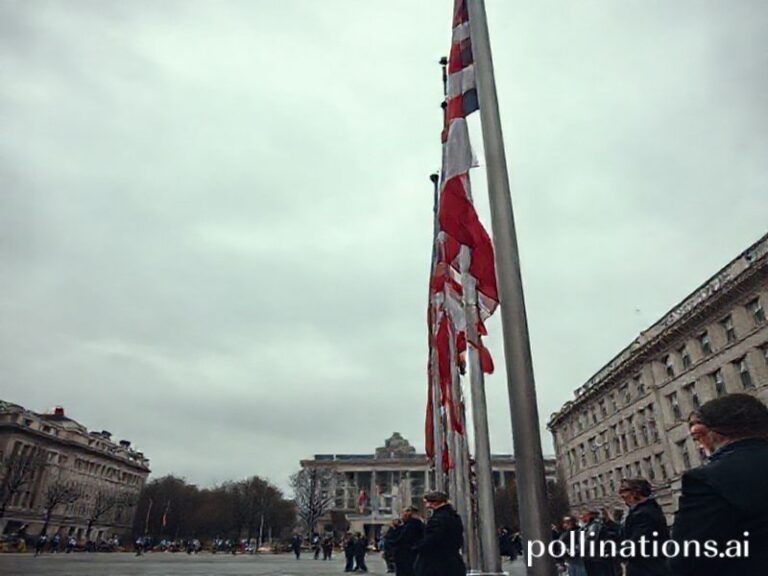From Southend to the Silk Road: How Jasmine Harman Became the Accidental Queen of Global Escapism
Jasmine Harman and the Global Cottage-Core Arms Race
By Our Correspondent in the Department of Soft-Furnishings Geopolitics
You may know Jasmine Harman as the relentlessly upbeat presenter who once persuaded a retired couple from Southend to trade a three-bed semi for a crumbling finca in Alicante on A Place in the Sun. What you probably missed—because CNN has been busy with minor side-shows like wars and elections—is that she is now the unlikely fulcrum of a worldwide property-escapism complex that makes the Cold War look like a polite disagreement over curtain swatches.
From Lisbon to Lagos, Auckland to Asheville, Harman’s sun-drenched walkthroughs have become the aspirational wallpaper for a planet desperate to outrun inflation, authoritarian backsliding, and the creeping suspicion that the algorithm has already sold our dreams back to us at a markup. In Buenos Aires, where the peso performs daily interpretive dance, young professionals binge her back catalogue in coworking cafés that smell of desperation and oat-milk cortados, calculating how many more pesos must be sacrificed to the Dólar Blue gods before they, too, can possess an infinity pool that overlooks someone else’s misery.
Meanwhile, in Seoul, ultra-lux developers screen her episodes on silent loop in showrooms that resemble Apple Stores redesigned by Marie Kondo after a mild concussion. The message is subtle but brutal: if you can’t afford Gangnam, there’s always Portugal’s Silver Coast, where the Wi-Fi reaches the lemon grove and EU citizenship comes as a complimentary gift-with-purchase.
The Chinese market has proven especially ravenous. Real-estate TikTok influencers—dubbed “Jasminfluencers”—have learned to lip-sync her catchphrases in Mandarin. Beijing’s new property-swap app, “Xi Jinping’s Place in the Sun,” crashed within minutes of launch; its servers simply couldn’t handle 30 million simultaneous queries for “two-bed within walking distance of pastel de nata.”
International estate agents now speak of “doing a Harman” the way hedge-fund bros once dropped “doing a Soros.” It means staging a ruin so artfully that viewers confuse rising damp with rustic authenticity. In Mexico City, cartel-adjacent developers have taken note, hiring British production crews to replicate that ineffable Costa del Sol glow—minus the inconvenient daylight shootings. The resulting listings promise “Mediterranean vibes, Caribbean adjacent,” a bit of geographic sleight-of-hand that would make the UN cartographers weep into their meridians.
At Davos this year, a secret panel titled “Jasmine as Soft Power” was reportedly convened behind a fake bookcase at the Belvedere. Attendees—tech oligarchs, Gulf royals, and one very confused Scandinavian interior minister—debated whether Harman’s relentless optimism could be weaponised to counter China’s Belt and Road with something fluffier: a Quilt-and-Road initiative, perhaps, exporting throw pillows instead of concrete. The minutes, naturally, were leaked on a mood-board Pinterest account.
The darker implication is that the entire global housing shortage now hinges on a woman who once squealed over an outdoor pizza oven as if it were the Treaty of Westphalia. While refugees cling to rafts in the Mediterranean, middle-class Norwegians are panic-buying villas in Sicily because Jasmine assured them the locals are “so welcoming,” a phrase that translates roughly to “property taxes haven’t caught up yet.”
Still, one must admire the brutal efficiency: why fix domestic policy when you can simply broadcast the illusion of elsewhere? Governments from Ottawa to Canberra quietly subsidise overseas property shows as a release valve for discontent—emigration by flat-screen. It’s cheaper than social housing and pairs nicely with a crisp Albariño.
And so, somewhere in a Stockholm suburb, a 34-year-old UX designer called Maja toggles between doom-scrolling climate reports and Jasmine coaxing a Welsh dentist toward a whitewashed cave house in Andalucía. Maja books a viewing flight, reasoning that if the world is ending, she might as well default on a mortgage beneath bougainvillea.
In the end, Jasmine Harman hasn’t just sold real estate; she’s franchised hope in 4K HDR, available on every continent except Antarctica—although give the penguins time. Because when the ice caps melt, you can bet some enterprising agent will list the newly beachfront Ross Ice Shelf as “breathtaking open-plan, zero neighbors, 24-hour daylight, cash buyers only.”
And Jasmine will be there, armed with a tasteful sisal rug and a smile bright enough to blind you to the rising tide.







